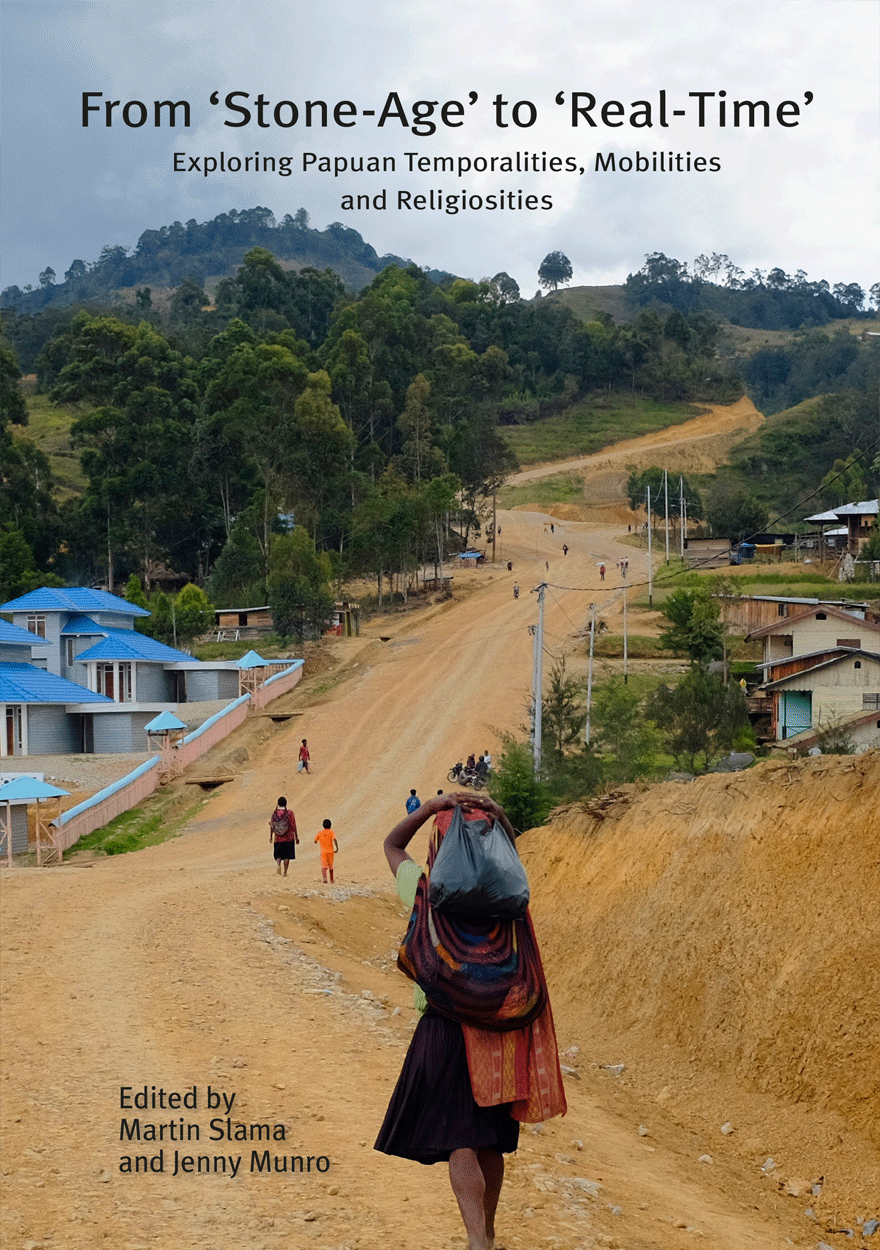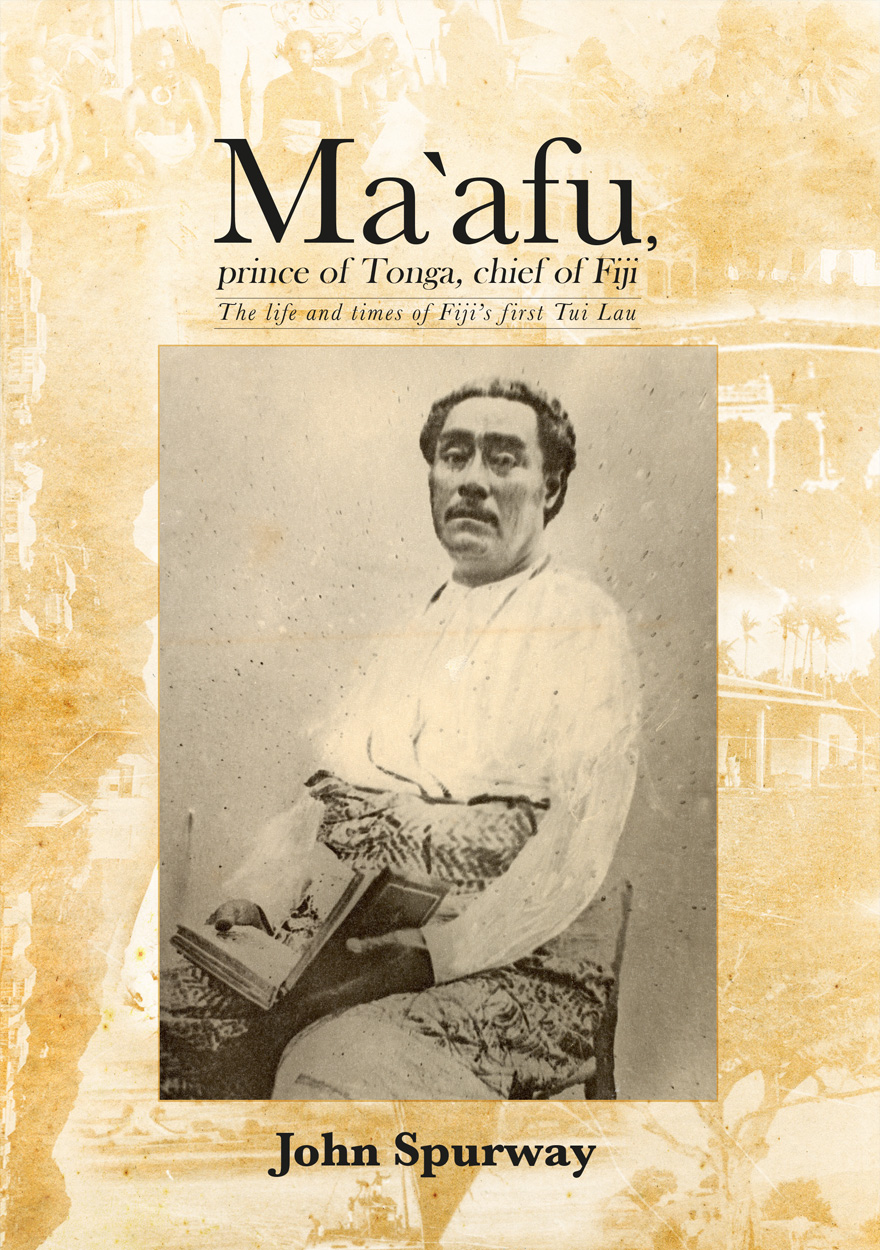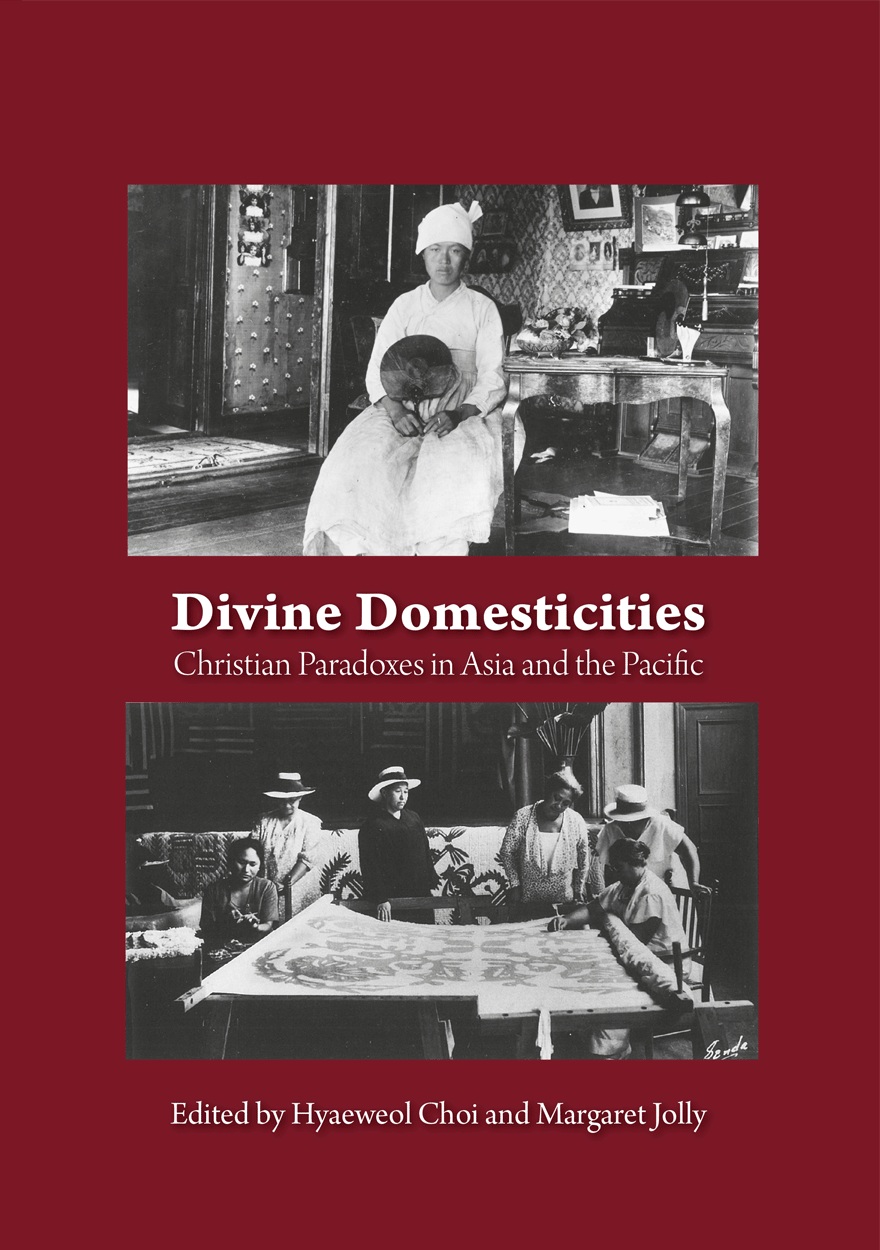Search titles
Displaying results 61 to 70 of 202.

From 'Stone-Age' to 'Real-Time' »
Exploring Papuan Temporalities, Mobilities and Religiosities
Edited by: Martin Slama, Jenny Munro
Publication date: April 2015
There are probably no other people on earth to whom the image of the ‘stone-age’ is so persistently attached than the inhabitants of the island of New Guinea, which is divided into independent Papua New Guinea and the western part of the island, known today as Papua and West Papua. From ‘Stone-Age’ to ‘Real-Time’ examines the forms of agency, frictions and anxieties the current moment generates in West Papua, where the persistent ‘stone-age’ image meets the practices and ideologies of the ‘real-time’ – a popular expression referring to immediate digital communication. The volume is thus essentially occupied with discourses of time and space and how they inform questions of hierarchy and possibilities for equality. Papuans are increasingly mobile, and seeking to rework inherited ideas, institutions and technologies, while also coming up against palpable limits on what can be imagined or achieved, secured or defended. This volume investigates some of these trajectories for the cultural logics and social or political structures that shape them. The chapters are highly ethnographic, based on in-depth research conducted in diverse spaces within and beyond Papua. These contributions explore topics ranging from hip hop to HIV/ AIDS to historicity, filling much-needed conceptual and ethnographic lacunae in the study of West Papua.

New Accountabilities, New Challenges »
Publication date: April 2015
This important and challenging volume of essays draws on insights from leading academics and public servants from Australia, New Zealand, the United Kingdom, Canada and elsewhere. It provides an excellent series of critiques of both the systemic accountabilities and the policy processes of government by drawing on meticulously researched, topical and real-world case studies of governance. Its contribution to the understanding of the applied processes of government in this way is exemplary. Topics covered include: restoring trust in government, parliamentary scrutiny of the APS, administrative law and FOI, budgetary reforms, implementation issues, competition policy, indigenous administration, collaboration with the NGO sector, educational reforms and the changes to the Auditor- General’s mandate.

Ma`afu, prince of Tonga, chief of Fiji »
The life and times of Fiji’s first Tui Lau
Authored by: John Spurway
Publication date: February 2015
Enele Ma`afu, son of Aleamotu`a, Tu`i Kanokupolu, grew up during a time of unprecedented social and political change in Tonga following the advent of Christianity. Moving to Lau, Fiji, in 1847 when he was about 21, he skilfully exploited kinship links to establish a power base there and in eastern Cakaudrove. His achievements were recognised in 1853 when his cousin King Tupou I appointed Ma`afu as Governor of the Tongans in Fiji.
Acting as a putative champion of the lotu, Ma`afu undertook successful military campaigns elsewhere in Fiji and, after adding the Yasayasa Moala and the Exploring Isles to the nascent Lauan state, he was able to establish the Tovata ko Lau, a union of Lau, Cakaudrove and Bua, with himself as head. His power was formally recognised in 1869 when the Lauan chiefs appointed him as Tui Lau, a new title in the polity of Fiji. Ma`afu was now able to challenge Cakobau for the mastery of Fiji.
After serving as Viceroy during the farcical planter oligarchy known as the Kingdom of Fiji, Ma`afu underwent a severe humiliation when, in order to maintain his power in Lau, he was forced to accede to the wishes of Fiji’s other great chiefs in offering their islands to Great Britain. He would end his days as Roko Tui Lau, a ‘subordinate administrator’ in the Crown Colony of Fiji, presiding over a province characterised by corruption and maladministration but where the legacy of his earlier innovative land reforms has endured.

Name, Shame and Blame »
Criminalising Consensual Sex in Papua New Guinea
Authored by: Christine Stewart
Publication date: December 2014
Papua New Guinea is one of the many former British Commonwealth colonies which maintain the criminalisation of the sexual activities of two groups, despite the fact that the sex takes place between consenting adults in private: sellers of sex and males who have sex with males. The English common law system was imposed on the colonies with little regard for the social regulation and belief systems of the colonised, and in most instances, was retained and developed post-Independence, regardless of the infringements of human rights involved.
Now the HIV pandemic has thrown a spotlight, not altogether welcome, on the sexual activities of these two groups. In Papua New Guinea, a growing body of behavioural research has focused on such matters as individual sexual partnering, condom use and awareness of HIV. My work, however, has a different purpose. I chose the terms in the title to highlight a nexus which I believe exists between the criminal law and negative attitudes of society. At an international level, the argument has been put that decriminalising sex work and sodomy will facilitate HIV epidemic management, reducing the stigma and discrimination these groups encounter and making them easier to reach. I undertook my research therefore with the aim of gaining deeper understanding of the effects the current situation of criminalisation might have on the social lives of these criminalised people today, in the country generally and in Port Moresby the capital in particular, and whether these effects might provide evidence to support the argument for law reform.
This is a rich and well-researched study of the legal, social and moral issues surrounding the criminalisation of two forms of consensual sex…. A very impressive piece of work, it is extensively documented, relies on a wide range of material and makes a clear and coherent argument about the place of law in producing identities and exclusions…. The attention to change over time and the complexity of the ways in which sexual behaviour is enacted and punished is a particular strength of the book.
—Professor Sally Engle Merry, Anthropology, Law and Society, New York University
This book is an exceptional contribution to our knowledge of the nexus between the criminal law and negative attitudes of society, and what effects criminalization has on the social lives of prostitutes and males who have sex with males, and whether these effects might provide evidence to support the argument for law reform…. The author’s experience of Papua New Guinea allows her to comment in depth on such matters as the United Nations’ human rights approach to the HIV epidemic and their call to decriminalize all sexual acts between consenting adults…. She shows that criminal laws—with the help of the normative discourse of religion and media—underpin and legitimize high levels of stigma, discrimination and abuse of prostitutes and males who have sex with males…. The quality of the writing and general presentation are exceptional.
—Laura Zimmer-Tamakoshi, Truman State University (retired)

Fiji: A Place Called Home »
Authored by: Daryl Tarte
Publication date: November 2014
Few people have been in the unique position of being able to observe and record the dramatic changes that have taken place in the islands of Fiji over the past 80 years than fourth-generation citizen, Daryl Tarte. He writes emotively, in great detail, about his personal experience of growing up on a remote island during the colonial era, when races were segregated, and white people lived an elite existence.
Following independence, he has been personally involved with many of the key economic, political and social activities that have evolved and enabled the nation to progress during the 20th century. These include the sugar industry, tourism, commerce and industry, religion, the media, women and of course, the coups.
His observations into the complexities of leadership in these areas of national development are fascinating and perceptive. Much of the story is told through the eyes of the many people of all races with whom he has interacted.
Fiji is made up of over 300 unique islands. Tarte has been to many of them, and in a final chapter he gives an insightful commentary of how different they all are.

The Naturalist and his 'Beautiful Islands' »
Charles Morris Woodford in the Western Pacific
Authored by: David Russell Lawrence
Publication date: October 2014
‘I know no place where firm and paternal government would sooner produce beneficial results then in the Solomons … Here is an object worthy indeed the devotion of one’s life’.
Charles Morris Woodford devoted his working life to pursuing this dream, becoming the first British Resident Commissioner in 1897 and remaining in office until 1915, establishing the colonial state almost singlehandedly. His career in the Pacific extended beyond the Solomon Islands. He worked briefly for the Western Pacific High Commission in Fiji, was a temporary consul in Samoa, and travelled as a Government Agent on a small labour vessel returning indentured workers to the Gilbert Islands.
As an independent naturalist he made three successful expeditions to the islands, and even climbed Mt Popomanaseu, the highest mountain in Guadalcanal. However, his natural history collection of over 20,000 specimens, held by the British Museum of Natural History, has not been comprehensively examined. The British Solomon Islands Protectorate was established in order to control the Pacific Labour Trade and to counter possible expansion by French and German colonialists. It remaining an impoverished, largely neglected protectorate in the Western Pacific whose economic importance was large-scale copra production, with its copra considered the second-worst in the world.
This book is a study of Woodford, the man, and what drove his desire to establish a colonial protectorate in the Solomon Islands. In doing so, it also addresses ongoing issues: not so much why the independent state broke down, but how imperfectly it was put together in the first place.
David Russell Lawrence is an anthropologist who has managed environmental programs in Melanesia and Southeast Asia for the Great Barrier Reef Marine Park Authority. His most recent book was a re-examination of the place in Melanesian anthropology of the Finnish sociologist Gunnar Landtman who spent two years working with the Kiwai people of the lower Fly estuary. He recently managed a large-scale survey of 300 communities in the Solomon Islands for the Community Sector Program and has assisted with a number of the annual RAMSI People’s Surveys in the islands. This work has given him insight into the colonial heritage of the Solomon Islands and a desire to tell the story of the establishment of the British Solomon Islands Protectorate through the eyes of the first Resident Commissioner, Charles Morris Woodford.

A Political Memoir of the Anglo-French Condominium of the New Hebrides »
Authored by: Keith Woodward
Publication date: October 2014
Keith Woodward has produced an inside account of the intricacies of official politics in the latter stages of the history of the Anglo-French Condominium of the New Hebrides, which will be essential reading for anyone interested in the colonial period of Vanuatu. Woodward spent 25 years in the New Hebrides (1953 to 1978) based in the British Residency and it is his long service which makes his memoir so informative and important. Following a fascinating and insightful description of Port Vila and the New Hebrides when he arrived in the 1950s, Woodward focuses the rest of his memoir on issues relating to the difficulties the British faced in convincing the French that the two powers should come to an agreement on decolonisation of the New Hebrides—that is, to establish a process of constitutional advancement leading ultimately to independence.
— Howard Van Trease, Honorary Research Fellow, Emalus Campus, University of the South Pacific, Port Vila
This is a highly original, evocative and engaging memoir which offers an insightful firsthand account of colonial administration, bilateral French and British relations, political change and decolonisation in Vanuatu. It addresses some lacunae in the historiography of Vanuatu and dispels a number of assumptions about French intentions there. It will be of great benefit to people interested in Vanuatu, and more broadly in political change in the Pacific, constitutional arrangements, decolonisation, French-British relations, and particularly the divergent colonial policies of France and the United Kingdom.
— Gregory Rawlings, Anthropology, University of Otago

Caretaker Conventions in Australasia »
Minding the shop for government
Authored by: Jennifer Menzies, Anne Tiernan
Publication date: October 2014
In the second revised edition of this monograph, Jennifer Menzies and Anne Tiernan capably chart the often hazardous terrain of the ‘caretaker period’ that ensues from the time an election is called until a new government is formed. This is a landscape fraught with political and administrative dangers – particularly for public servants who are required to ‘mind the shop’ and keep the basically machinery of government going.
The conventions represent an historical accretion of custom, practice and rules, often leavened with uncertainty. In tackling their subject, Menzies and Tiernan draw upon their shared past experiences as public servants and ministerial ‘staffers’ as well as the highest standards of academic scholarship – this is a ‘must read’ for politicians, public servants and students of government. The second edition expands on the first edition by documenting recent controversies and trends which have had an impact on caretaker conventions.
The analysis of the contemporary application of caretaker conventions has been updated and new case studies included – particularly from the last federal election. Also included is additional material about lengthy government formation after election day and the management of caretaker conventions during that time. The New Zealand material has been revised and updated.
The caretaker conventions
Australia (PDF, 127KB)
Australian Capital Territory (PDF, 187KB)
New South Wales (PDF, 234 KB)
Northern Territory (PDF, 175KB)
Queensland (PDF, 94KB)
South Australia (PDF, 224KB)
Tasmania (PDF, 232KB)
Victoria (PDF, 178KB)
Western Australia (PDF, 430KB)
New Zealand (PDF, 280KB)

Divine Domesticities »
Christian Paradoxes in Asia and the Pacific
Edited by: Hyaeweol Choi, Margaret Jolly
Publication date: October 2014
Divine Domesticities: Christian Paradoxes in Asia and the Pacific fills a huge lacuna in the scholarly literature on missionaries in Asia/Pacific and is transnational history at its finest. Co-edited by two eminent scholars, this multidisciplinary volume, an outgrowth of several conferences/seminars, critically examines various encounters between western missionaries and indigenous women in the Pacific/Asia … Taken as a whole, this is a thought-provoking and an indispensable reference, not only for students of colonialism/imperialism but also for those of us who have an interest in transnational and gender history in general. The chapters are very clearly written, engaging, and remarkably accessible; the stories are compelling and the research is thorough. The illustrations are equally riveting and the bibliography is extremely useful.
—Theodore Jun Yoo, History Department, University of Hawai’i
The editors of this collection of papers have done an excellent job of creating a coherent set of case studies that address the diverse impacts of missionaries and Christianity on ‘domesticity’, and therefore on the women and children who were assumed to be the rightful inhabitants of that sphere … The introduction to the volume is beautifully written and sets up the rest of the volume in a comprehensive way. It explains the book’s aim to advance theoretical and methodological issues by exploring the role of missionary encounters in the development of modern domesticities; showing the agency of indigenous women in negotiating both change and continuity; and providing a wide range of case studies to show ‘breadth and complexity’ and the local and national specificities of engagements with both missionaries and modernity. My view is that all three aims are well and truly fulfilled.
—Helen Lee, Head, Sociology and Anthropology, La Trobe University, Melbourne

Degei's Descendants »
Spirits, Place and People in Pre-Cession Fiji
Edited by: Matthew Spriggs, Deryck Scarr
Publication date: August 2014
Dr Parke’s monograph examines how Fijians, especially in western areas of Fiji, currently understand and explain the origins and development of the social and political divisions of late pre-colonial traditional Fijian society. It assesses the reasoning, consistency and, where possible, the historical accuracy of such understandings. The oral history research which forms the backbone of the study was conducted in either standard Fijian or one or other of the western Fijian dialects with which Dr Parke was familiar.
The period on which the monograph concentrates is the two centuries or so immediately prior to the Deed of Cession on 10 October 1874. A number of the major chiefs of Fiji had offered to cede Fiji to Queen Victoria; and after the offer had been accepted, Fiji became a British Crown Colony on that day. The volume will be of interest to all archaeologists, anthropologists and historians with an interest in Fiji. It will also be of wider interest to Pacific Studies scholars and those of British colonial history as well as historians with a wider interest in indigenous traditional histories and their role in governance today.



